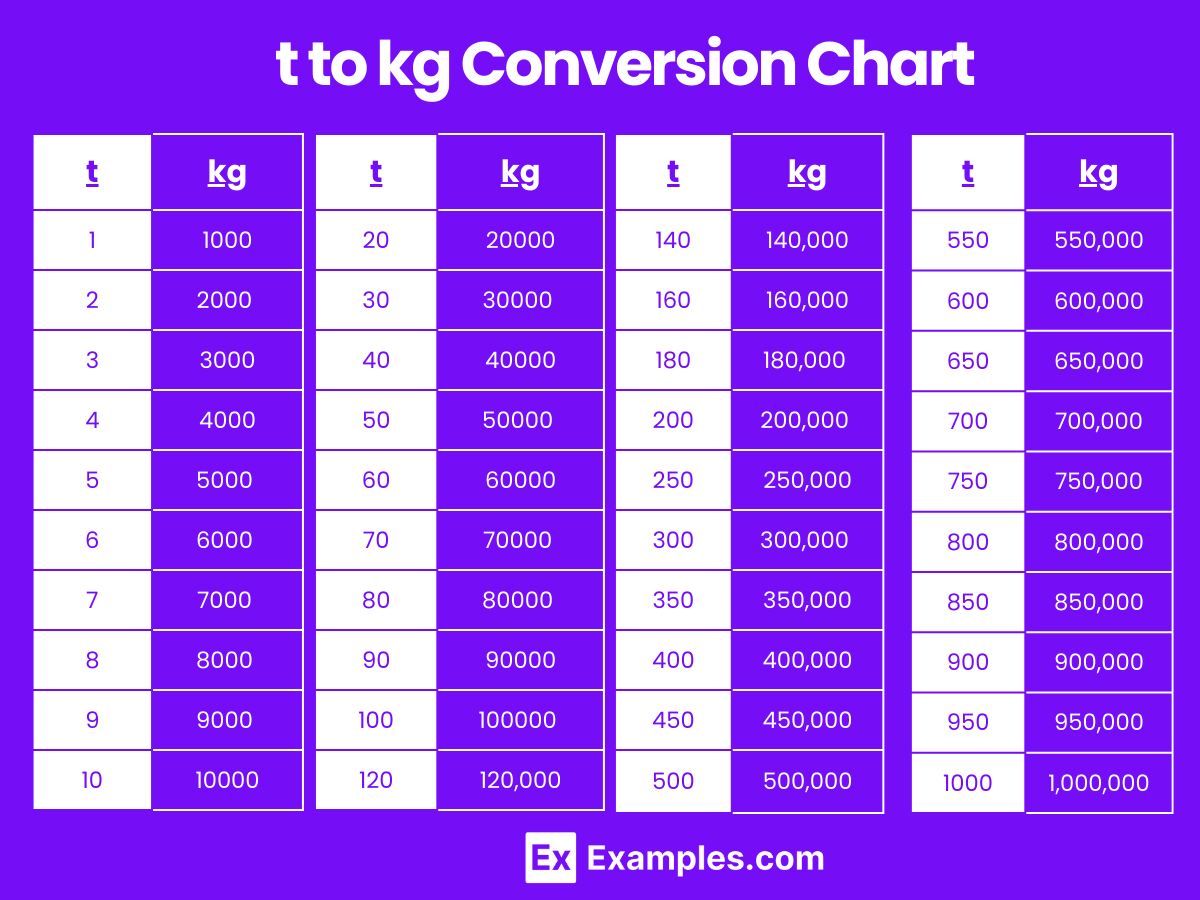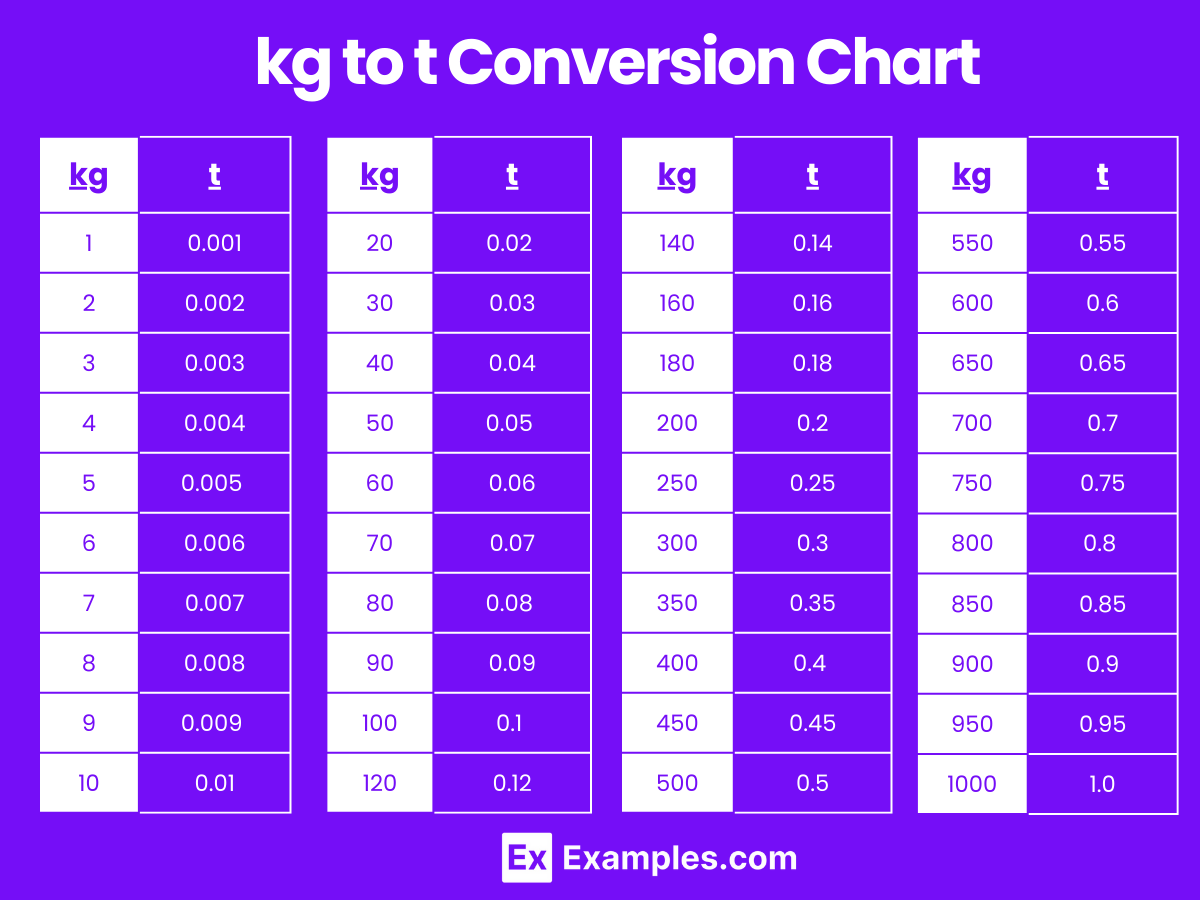Convert tonnes to kilograms and vice versa with Examples.com. Simply input your values for immediate and precise conversion results.
Ton to Kg
Formula:Mass in KG (KG)=Mass in Tonnes (Ton)*1000
Tonnes :
KG :
| Tonnes | KG |
|---|---|
| 1 | 1000 |
KG to Ton
Formula:Mass in Tonnes (Ton) =Mass in KG (KG) x0.001
KG :
Tonnes :
| KG | Tonnes |
|---|---|
| 1 | 0.001 |
Mass Converters to Tonne (t)
| Kilogram to Tonne | Gram to Tonne | Milligram to Tonne |
| Microgram to Tonne | Imperial ton to Tonne | US ton to Tonne |
| Stone to Tonne | Pound to Tonne | Ounce to Tonne |
Mass Converters to Kilogram (kg)
| Tonne to Kilogram | Gram to Kilogram | Milligram to Kilogram |
| Microgram to Kilogram | Imperial ton to Kilogram | US ton to Kilogram |
| Stone to Kilogram | Pound to Kilogram | Ounce to Kilogram |
Conversion Factors:
- Tonnes to Kilograms: 1 tonne = 1000 kilograms
- Kilograms to Tonnes: 1 kilogram = 0.001 tonnes
How to Convert Tonnes to Kilograms:
To convert tonnes to kilograms, multiply the number of tonnes by 1000.
Kilograms=Tonnes×1000
Example: Convert 5 tonnes to kilograms.
Kilograms=5×1000=5000 kilograms
How to Convert Kilograms to Tonnes:
To convert kilograms to tonnes, multiply the number of kilograms by 0.001.
Tonnes=Kilograms×0.001
Example: Convert 3000 kilograms to tonnes.
Tonnes=3000×0.001=3 tonnes
Tonnes to Kilograms Conversion Table
| Tonnes (t) | Kilograms (kg) |
|---|---|
| 1 t | 1000 kg |
| 2 t | 2000 kg |
| 3 t | 3000 kg |
| 4 t | 4000 kg |
| 5 t | 5000 kg |
| 6 t | 6000 kg |
| 7 t | 7000 kg |
| 8 t | 8000 kg |
| 9 t | 9000 kg |
| 10 t | 10000 kg |
| 20 t | 20000 kg |
| 30 t | 30000 kg |
| 40 t | 40000 kg |
| 50 t | 50000 kg |
| 60 t | 60000 kg |
| 70 t | 70000 kg |
| 80 t | 80000 kg |
| 90 t | 90000 kg |
| 100 t | 100000 kg |
t to kg Conversion Chart

Kilograms to Tonnes Conversion Table
| Kilograms (kg) | Tonnes (t) |
|---|---|
| 1 kg | 0.001 t |
| 2 kg | 0.002 t |
| 3 kg | 0.003 t |
| 4 kg | 0.004 t |
| 5 kg | 0.005 t |
| 6 kg | 0.006 t |
| 7 kg | 0.007 t |
| 8 kg | 0.008 t |
| 9 kg | 0.009 t |
| 10 kg | 0.01 t |
| 20 kg | 0.02 t |
| 30 kg | 0.03 t |
| 40 kg | 0.04 t |
| 50 kg | 0.05 t |
| 60 kg | 0.06 t |
| 70 kg | 0.07 t |
| 80 kg | 0.08 t |
| 90 kg | 0.09 t |
| 100 kg | 0.1 t |
kg to t Conversion Chart

Differences Between Tonnes to Kilograms
| Aspect | Tonnes (t) | Kilograms (kg) |
|---|---|---|
| Definition | A metric unit equal to 1,000 kilograms | A metric unit of mass equal to one thousand grams |
| Conversion Factor | 1 t = 1,000 kg | 1 kg = 0.001 t |
| Usage | Used for measuring large masses and weights | Commonly used for everyday weight measurements |
| Applications | Shipping, industrial equipment | Grocery, personal weight scales |
| Measurement Range | Suitable for heavy loads and large quantities | Suitable for lighter objects and smaller quantities |
| Scale | Larger unit in the metric system | Smaller unit in the metric system |
| Scientific Notation | 1 t = 1 x 10^3 kg | 1 kg = 1 x 10^-3 t |
| Example | A car weighs approximately 1.5 tonnes | A bag of rice weighs approximately 5 kilograms |
| Technology Use | Used in construction and manufacturing | Used in laboratory measurements |
1. Solved Examples on Converting Tonnes to Kilograms
Example 1:
Problem: Convert 3 tonnes to kilograms.
Solution:
1 tonne = 1,000 kilograms
Therefore, 3 tonnes = 3 × 1,000 = 3,000 kilograms.
3 tonnes is equal to 3,000 kilograms.
Example 2:
Problem: Convert 0.5 tonnes to kilograms.
Solution:
1 tonne = 1,000 kilograms
Therefore, 0.5 tonnes = 0.5 × 1,000 = 500 kilograms.
0.5 tonnes is equal to 500 kilograms.
Example 3:
Problem: Convert 7.8 tonnes to kilograms.
Solution:
1 tonne = 1,000 kilograms
Therefore, 7.8 tonnes = 7.8 × 1,000 = 7,800 kilograms.
7.8 tonnes is equal to 7,800 kilograms.
Example 4:
Problem: Convert 12 tonnes to kilograms.
Solution:
1 tonne = 1,000 kilograms
Therefore, 12 tonnes = 12 × 1,000 = 12,000 kilograms.
12 tonnes is equal to 12,000 kilograms.
Example 5:
Problem: Convert 0.25 tonnes to kilograms.
Solution:
1 tonne = 1,000 kilograms
Therefore, 0.25 tonnes = 0.25 × 1,000 = 250 kilograms.
0.25 tonnes is equal to 250 kilograms.
2. Solved Examples on Converting Kilograms to Tonnes
Example 1:
Problem: Convert 5,000 kilograms to tonnes.
Solution:
1 kilogram = 0.001 tonnes
Therefore, 5,000 kilograms = 5,000 × 0.001 = 5 tonnes.
5,000 kilograms is equal to 5 tonnes.
Example 2:
Problem: Convert 750 kilograms to tonnes.
Solution:
1 kilogram = 0.001 tonnes
Therefore, 750 kilograms = 750 × 0.001 = 0.75 tonnes.
750 kilograms is equal to 0.75 tonnes.
Example 3:
Problem: Convert 2,500 kilograms to tonnes.
Solution:
1 kilogram = 0.001 tonnes
Therefore, 2,500 kilograms = 2,500 × 0.001 = 2.5 tonnes.
2,500 kilograms is equal to 2.5 tonnes.
Example 4:
Problem: Convert 12,000 kilograms to tonnes.
Solution:
1 kilogram = 0.001 tonnes
Therefore, 12,000 kilograms = 12,000 × 0.001 = 12 tonnes.
12,000 kilograms is equal to 12 tonnes.
Example 5:
Problem: Convert 320 kilograms to tonnes.
Solution:
1 kilogram = 0.001 tonnes
Therefore, 320 kilograms = 320 × 0.001 = 0.32 tonnes.
320 kilograms is equal to 0.32 tonnes.
Why do we need to convert between tonnes and kilograms?
Converting between tonnes and kilograms is necessary for various applications, such as shipping, construction, manufacturing, and everyday weight measurements, to ensure consistency and accuracy in weight calculations.
Are there any tools available for converting tonnes to kilograms?
Yes, there are many online calculators and conversion tools available that can easily convert tonnes to kilograms and vice versa. Additionally, most digital scales can display weight in both units.
How is tonne different from a short ton or a long ton?
A tonne (metric ton) is equal to 1,000 kilograms. A short ton, commonly used in the United States, is equal to 2,000 pounds or approximately 907.185 kilograms. A long ton, commonly used in the United Kingdom, is equal to 2,240 pounds or approximately 1,016.047 kilograms.
Are there any industries that prefer using tonnes over kilograms?
Yes, industries such as shipping, construction, mining, and heavy manufacturing prefer using tonnes over kilograms due to the large masses they deal with. Using tonnes simplifies calculations and reporting.
How do businesses benefit from using tonnes and kilograms in their operations?
Businesses benefit from using tonnes and kilograms by ensuring accurate weight measurements for inventory, shipping, production, and quality control. This accuracy helps in cost estimation, pricing, logistics planning, and compliance with regulations.

